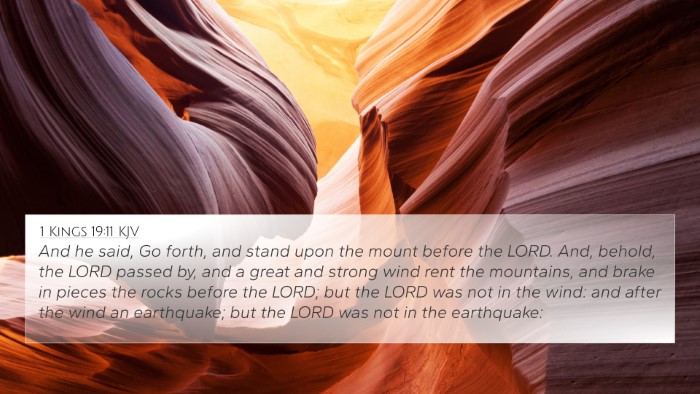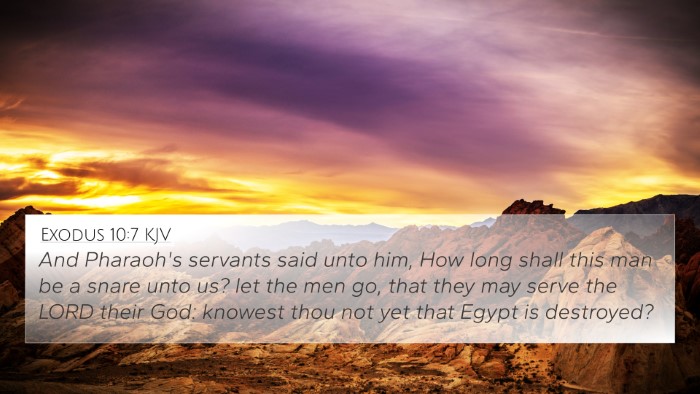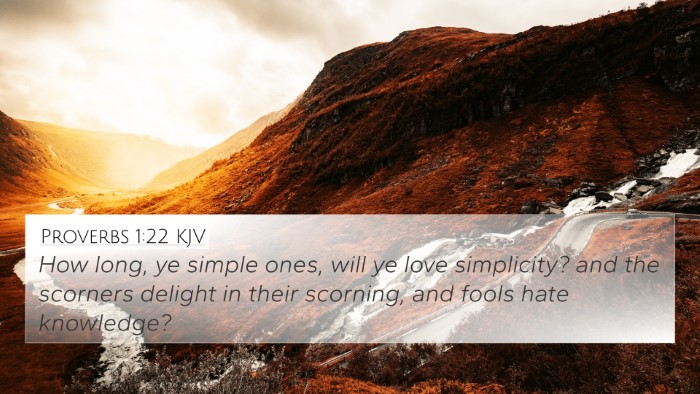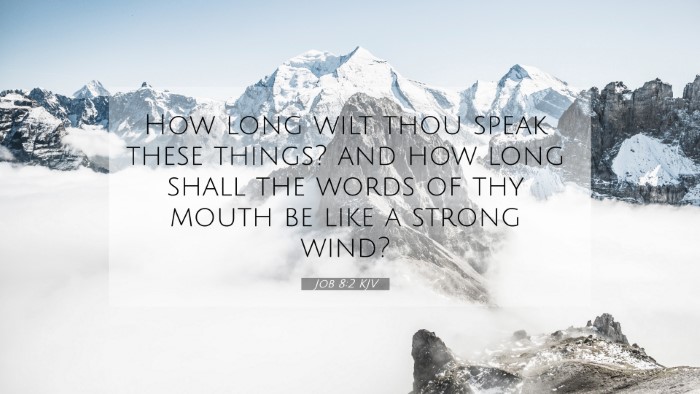Old Testament
Genesis Exodus Leviticus Numbers Deuteronomy Joshua Judges Ruth 1 Samuel 2 Samuel 1 Kings 2 Kings 1 Chronicles 2 Chronicles Ezra Nehemiah Esther Job Psalms Proverbs Ecclesiastes Song of Solomon Isaiah Jeremiah Lamentations Ezekiel Daniel Hosea Joel Amos Obadiah Jonah Micah Nahum Habakkuk Zephaniah Haggai Zechariah MalachiJob 8:2 Similar Verses
Job 8:2 Cross References
How long wilt thou speak these things? and how long shall the words of thy mouth be like a strong wind?
Uncover the Rich Themes and Topics of This Bible Verse
Listed below are the Bible themes associated with Job 8:2. We invite you to explore each theme to gain deeper insights into the Scriptures.
Job 8:2 Cross Reference Verses
This section features a detailed cross-reference designed to enrich your understanding of the Scriptures. Below, you will find carefully selected verses that echo the themes and teachings related to Job 8:2 KJV. Click on any image to explore detailed analyses of related Bible verses and uncover deeper theological insights.

Job 6:26 (KJV) »
Do ye imagine to reprove words, and the speeches of one that is desperate, which are as wind?

1 Kings 19:11 (KJV) »
And he said, Go forth, and stand upon the mount before the LORD. And, behold, the LORD passed by, and a great and strong wind rent the mountains, and brake in pieces the rocks before the LORD; but the LORD was not in the wind: and after the wind an earthquake; but the LORD was not in the earthquake:

Exodus 10:3 (KJV) »
And Moses and Aaron came in unto Pharaoh, and said unto him, Thus saith the LORD God of the Hebrews, How long wilt thou refuse to humble thyself before me? let my people go, that they may serve me.

Job 7:11 (KJV) »
Therefore I will not refrain my mouth; I will speak in the anguish of my spirit; I will complain in the bitterness of my soul.

Job 18:2 (KJV) »
How long will it be ere ye make an end of words? mark, and afterwards we will speak.

Job 6:9 (KJV) »
Even that it would please God to destroy me; that he would let loose his hand, and cut me off!

Job 11:2 (KJV) »
Should not the multitude of words be answered? and should a man full of talk be justified?

Exodus 10:7 (KJV) »
And Pharaoh's servants said unto him, How long shall this man be a snare unto us? let the men go, that they may serve the LORD their God: knowest thou not yet that Egypt is destroyed?

Proverbs 1:22 (KJV) »
How long, ye simple ones, will ye love simplicity? and the scorners delight in their scorning, and fools hate knowledge?
Job 8:2 Verse Analysis and Similar Verses
Meaning of Job 8:2
Job 8:2 states:
"How long will you say these things, and the words of your mouth be a great wind?"
Summary of Insights
In examining Job 8:2, we draw upon the insights from several esteemed public domain commentaries, including those by Matthew Henry, Albert Barnes, and Adam Clarke. This verse captures the essence of Bildad's response to Job's lamentations following his immense suffering. Bildad's rhetorical question serves as a critique of Job's persistent statements regarding his affliction.
Contextual Overview
After Job has expressed his anguish and the pain of his circumstances, Bildad, one of Job's friends, believes it is time to confront Job's assertions. He questions the validity of Job's complaints, implying that they are exaggerated and worthless, likening them to "a great wind." This metaphor suggests that Job's words carry no substance or truth and are akin to empty rhetoric.
Thematic Significance
- Speech and Silence: Bildad's response highlights a critical theme in the Book of Job: the relationship between speech and suffering. How one articulates pain reveals not just their emotional state but also their understanding of divine justice.
- Divine Justice: Bildad embodies traditional views of divine justice; he assumes that Job’s suffering must be a result of sin and thus invites Job to reflect on his words.
Commentary Insights
Here are the key insights from public domain commentaries:
- Matthew Henry: Henry emphasizes that Bildad speaks with a boldness that lacks compassion, arguing that Job's introspection is warranted and that his cries for help should not be dismissed as mere wind.
- Albert Barnes: Barnes interprets this as a challenge to Job to recognize the futility of his complaints. He suggests Bildad calls for reason over emotion in the face of suffering.
- Adam Clarke: Clarke notes that Bildad's reply may stem from a misunderstanding of Job’s deep theological struggles, urging that Job is in search of a deeper understanding of God’s nature through his trials.
Cross-References
This verse can be connected with several other Bible scriptures that discuss themes of suffering, divine justice, and the nature of speech:
- Job 6:26 - "Do you think that you can reprove words, as if the speech of the desperate were wind?"
- Job 13:5 - "If only you would be silent! For you, that would be wisdom."
- Proverbs 18:21 - "Death and life are in the power of the tongue..."
- James 1:19 - "Everyone should be quick to listen, slow to speak, and slow to become angry."
- 1 Peter 3:15 - "Always be prepared to give an answer to everyone who asks you to give the reason for the hope that you have..."
- Psalms 34:13 - "Keep your tongue from evil and your lips from speaking deceit."
- Ecclesiastes 5:2 - "Do not be quick with your mouth, do not be hasty in your heart to utter anything before God..."
Conclusion
In conclusion, Job 8:2 serves as a profound commentary on the dialogue surrounding suffering and the weight of utterances during such times. By understanding this verse within the context of the Book of Job and the insights brought forth by respected commentaries, readers can appreciate the complexity of human experiences and divine interactions with deeper clarity.





